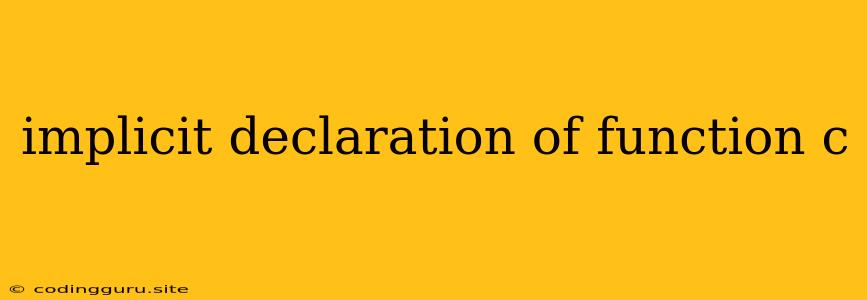The Mystery of "Implicit Declaration of Function" in C
Have you ever encountered the dreaded "implicit declaration of function" error message in your C code? This cryptic error message, often accompanied by a warning, can be a real head-scratcher for novice and seasoned C programmers alike.
Understanding Implicit Declaration
In the world of C programming, a function's definition lays out its return type, name, and parameters. This blueprint tells the compiler how the function works. However, sometimes you might find yourself using a function before you actually define it. This situation is known as an implicit declaration, and it's where the trouble begins.
Why is Implicit Declaration a Problem?
Imagine you're trying to assemble a puzzle without knowing what the final image will look like. That's what your compiler experiences when it encounters an implicit declaration: it's trying to figure out how to use a function without knowing its full definition. This can lead to unexpected and often incorrect results.
The Compiler's Dilemma
Let's break down why implicit declarations cause issues:
-
Guesswork: Without a proper definition, the compiler has to make assumptions about the function's return type and the types of its arguments. These assumptions might be wrong, leading to errors.
-
Potential Mismatches: If the compiler's assumptions about the function's parameters don't match the actual function definition, your program might produce incorrect output or even crash.
-
Type Safety Concerns: C is a language that prioritizes performance. It doesn't enforce strict type checking like some other languages. This means an implicit declaration might lead to subtle bugs that can be difficult to track down.
Common Scenarios
Here are some scenarios where you might encounter this error:
-
Missing Header Files: Header files like
stdio.horstring.hcontain the definitions for commonly used functions likeprintf,scanf, andstrlen. Forgetting to include these files will lead to implicit declarations of these functions. -
Misspelled Function Names: A simple typo in your function name can trigger an implicit declaration, as the compiler won't be able to find the correctly spelled definition.
-
Circular Dependencies: When two functions are defined in separate source files and each calls the other, you need to carefully manage the inclusion of header files to avoid implicit declarations.
Resolving the "Implicit Declaration of Function" Error
The solution is simple: make sure all functions are defined before they are used. Here's how:
-
Include Necessary Header Files: Always include the appropriate header files for the functions you're using. This provides the compiler with the definitions it needs.
-
Define Functions Before Using Them: If you're writing your own functions, define them before you use them in your code.
-
Declare Functions in Header Files: If you're working with multiple source files, declare your functions in a header file and include that header file in each source file that uses those functions.
Example
Let's consider a scenario where you're attempting to use the printf function without including stdio.h:
#include
int main() {
printf("Hello, world!"); // Implicit declaration of printf
return 0;
}
In this case, the compiler will throw the error "implicit declaration of function 'printf'". To fix this, simply include the stdio.h header file:
#include
int main() {
printf("Hello, world!"); // Correct, printf is now defined
return 0;
}
Beyond the Basics
While implicit declarations are generally frowned upon in C, there are some rare exceptions:
-
Inline Functions: Sometimes, functions are marked as
inlineto optimize performance. In these cases, implicit declarations might be allowed in specific contexts. -
Compilers with Extensions: Some compilers might offer extensions that allow implicit declarations under certain conditions. However, this practice is generally not recommended for portability.
Conclusion
Avoiding implicit declarations is crucial for writing clean, maintainable, and error-free C code. By understanding the underlying reasons for this error and following the recommended practices, you can eliminate this common source of frustration in your C programming journey. Remember: define functions before using them, include necessary header files, and avoid relying on compiler extensions that might compromise code portability.
